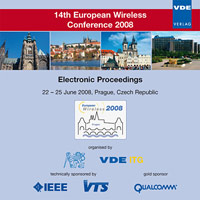Impact of Handoff Control Messages on VoIP over Wireless LAN System Capacity
Conference: European Wireless 2008 - 14th European Wireless Conference
06/22/2008 - 06/25/2008 at Prague, Czech Republic
Proceedings: European Wireless 2008
Pages: 5Language: englishTyp: PDF
Personal VDE Members are entitled to a 10% discount on this title
Authors:
Chui, Sai Kit; Yue, On-Ching; Lau, Wing Cheong (Department of Information Engineering, The Chinese University of Hong Kong)
Abstract:
A critical performance issue in providing VoIP service over wireless LANs is the voice packet delay due to handoffs as the user roams across different radio coverage regions. Most the recent research has focused on proactive approaches where control messages are transmitted from the mobile to prepare the access point and the other network nodes before the actual handoff occurs. Consequently, there is an increase in handoff control message traffic which will reduce the wireless LAN capacity to provide VoIP service. In this paper, we present a model for analyzing the effect of handoff control messages on the network capacity. To model the special “ON-OFF” characteristic of the voice sources in the real world, the Markov Modulated Poisson Process Model (MMPP) is used in the analysis. We assume that the control messages have higher priority than voice packets so that the service for voice packets also has an “ON-OFF” characteristic. The MMPP/MMPP/1 model was analyzed for different traffic characteristics (arrival rate and message lengths) depending on the handoff scheme used by the mobile stations in the network. For example, we show that the VoIP system capacity is reduced by 23% when the utilization of the control traffic is 4%. This analysis can provide a useful framework for the future development of different handoff schemes, trading off the higher success rate of handoff and decrease in network capacity.


